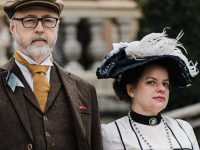If you ask ten people what larp is for them and why they do larp, you will probably get at least eleven different answers. For me, it is all about meeting my dearest friends. I recently turned 30, and all the people I invited to my party were people I met through larping. Unfortunately (or fortunately) due to how global our hobby is, a lot of those people live all over the world, and I only see them at larps. However, when I go to a typical weekend larp, though I get to enjoy an amazing larp, I never have enough time to talk to all the awesome people.
That’s one of the main reasons why I love an iFoL. IFoL, standing for “Its Full of Larps”, is typically a long weekend from Thursdays to Sunday, dedicated to short form larps (1-6 hours) played at a rented large house. Between the larps, there is lots of talking, cooking, board games, sometimes a sauna – in general, just having a good time together. It is like only experiencing the big moments of a larp while spending most of the time as yourself, not as a character. Or like being at one of the KP/SK conferences, but without panels and in a way smaller venue. This gives the participants more time to really get to know each other and spend time together between the games – instead of only having a short time for socialising at an after party after a larp.
Apart from the social aspect, the organisational design of iFoLs is quite different compared to a lot of larps these days. Since a couple of years ago, we have seen quite a big trend of commodification in larps (see Seregina 2019): the larper is more of an attendee than a participant, and larps are often more about buying experiences – not co-creating them. At an iFoL, the opposite applies: everyone is part of the organising team. This is emphasised in the design: an iFoL usually begins with the people who organised the venue and registration saying the iconic phrase: “Our part is over – now everyone is organising.” This shows the importance of co-creation at an iFoL.
This also means that the participants must be ready to volunteer to guide larps, to organise time schedules, to cook, to help with the logistics, and so on. And everyone must be involved in keeping the space clean. If you want something to happen, you must organise it yourself.
Usually, these roles are not appointed up front. Instead, people volunteer on the location. Apart from a food plan (due to needing to buy the groceries before), the final schedule of the event is decided spontaneously. Most of organising is done ad hoc; for example, to sign up for larps, participants may stand in a line after dinner to get a spot at a larp, or room corners may be reserved for different larps, with people gathering at specific corners to sign up for specific larps. These on-the-fly mechanisms make it easy to find out which larps still have open spots and which are full. Signups tend to be organised just a few hours before the games to allow people to arrive and organise their schedules flexibly.
The system of self-organising and co-creating works surprisingly well, though there are also some challenges. In an ideal world where responsibilities would be shared equally, the main tasks that need to be done before the event would be shared between all participants. However, in our non-ideal world, this does not work. To make the events happen reliably, there usually must be a smaller organising team that decides to facilitate an iFoL. This team manages the preliminary tasks such as booking the venue, handling participant registration, and organising the food for the event.
Additionally, there are always small things that require coordination – an ingredient missing from a meal, a participant needing to be picked up from the train station, or a person feeling lost at the event. The goal is to share these responsibilities between everyone, but usually the main organisers tend to be the first who are asked to provide help. They can then coordinate with the other participants and ask them to help with the tasks.
The events do not work well with too few or too many people. If there are less than 25 people, experience has shown that this leads to not many games being played, and people get disappointed for not being able to larp. Not everyone wants to play all the time, and if there is already a bigger larp with maybe 15 people attending, there might not be enough willing participants to play another larp simultaneously. Likewise, with over 35 people attending, self-organising does not work as well. In larger groups, people tend to rely on other people doing the required tasks and no longer feel responsible for the co-creation.
The participation fees of iFoLs are divided equally between everyone. Since iFoLs started, the tradition has been that everyone pays the same amount to participate, and this includes the main organisers. This was based on mutual co-creation – even the main organisers are just participants, and all participants are equal organisers. The main organisers have tasks before the event, but ideally they would not have to do anything anymore once at the location (though as said before, this ideal does not fully hold). However, equality is not the same as equity, and having everyone pay the same amount of money does not give everyone the same chance to participate. Thus subsidised and sponsor tickets have become available during the past years.
What I have written above have been my experiences on participating in iFoLs – and organising one. Even though the main idea is written down in the iFoL manifesto (Deutch & Kasper 2015), at the end iFoLs are about creating an experience together. They are not about attending as consumers – they are about co-creation and organising together. They are about spending time with old and new friends in a safe and welcoming environment to play larps, to talk, and to have fun together.
To have an iFoL work out well for all, you need to trust your fellow larpers. There are enough of us who want to co-create events together instead of buying experiences, and enough of us who are ready to take the responsibility. Over all my years of attending iFoLs, this mentality of co-creation and co-organising has permeated the events – and it is the main reason why I love iFoLs. In the end, this is what our community is about at its best: friendship.
Bibliography
Deutsch, Stefan & Kasper Larson. 2015. iFoL – it’s Full of Larps. http://ifol.magency.de/wp-content/uploads/2015/04/ifol-the-manifesto.pdf?fbclid=IwAR0htH7ZQfb8gWlvqgxRLo415no_ZB4xMRirPtLJ0Q-aYreXK5ovjUuKe3s
Seregina, Usva. 2019. On the Commodification of larp. Nordic larp. https://nordiclarp.org/2019/12/17/on-the-commodification-of-larp/
This article has been reprinted with permission from the Solmukohta 2024 book. Please cite as:
Kramer, Katharina. 2024. “On Co-creating Experiences – iFoL.” In Liminal Encounters: Evolving Discourse in Nordic and Nordic Inspired Larp, edited by Kaisa Kangas, Jonne Arjoranta, and Ruska Kevätkoski. Helsinki, Finland: Ropecon ry.
Cover photo: Photo by Kilimanjaro STUDIOz. Image has been cropped.






